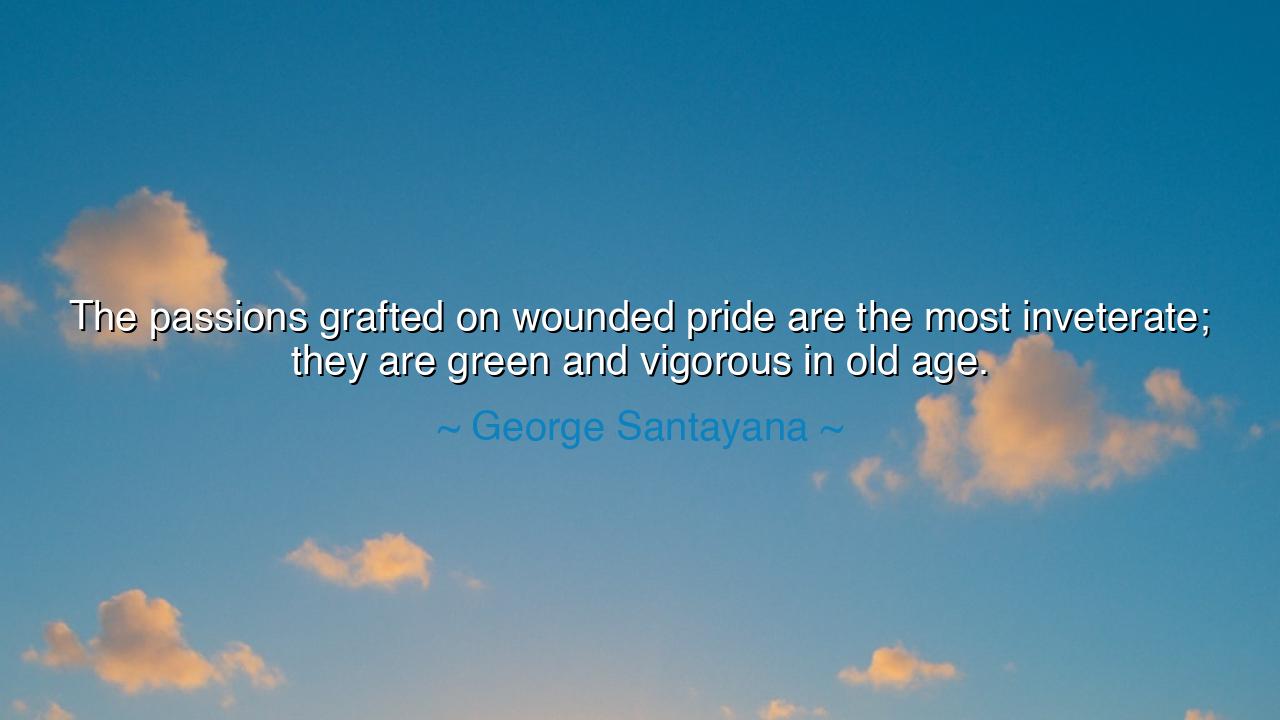
The passions grafted on wounded pride are the most inveterate;
The passions grafted on wounded pride are the most inveterate; they are green and vigorous in old age.






"The passions grafted on wounded pride are the most inveterate; they are green and vigorous in old age." These profound words from George Santayana speak to the deep and enduring nature of pride and wounded emotions. Santayana is not merely describing the effects of pride, but the way in which it lingers, festers, and grows when we are hurt—especially as we age. Pride, when wounded, can become a constant companion that never truly fades. It takes root in the soul like a persistent vine, growing green and vigorous, no matter how many years pass. In this quote, Santayana reflects on the human condition, revealing that wounded pride, far from diminishing with age, often grows stronger, more entrenched, and harder to overcome.
In the wisdom of the ancients, pride was often seen as a dangerous force. The Greek philosophers, particularly Socrates, spoke of pride as an obstacle to virtue and self-knowledge. Aristotle even argued that pride—or what he called megalopsychia—was a virtue when balanced by wisdom, but it could easily turn into arrogance if left unchecked. The ancients knew that pride, when wounded, could become a poison that poisoned the soul, making us cling to old grievances and feelings of injustice. Just as a wound on the body, if not treated, can become infected and spread, so too can the wounds to pride in the heart, causing us to nurture resentment and bitterness that poisons our entire existence.
Take, for example, the life of Achilles in the Iliad. His pride, wounded by Agamemnon’s dishonor, leads to his withdrawal from battle, causing the Greeks to suffer terribly. Achilles’ wounded pride is the driving force of the Iliad, and his rage, which begins as a youthful indignation, grows into an almost uncontrollable force. Despite the passage of time and the approach of his inevitable death, Achilles’ pride does not subside. Instead, it becomes the root of his actions, even after the wounds he receives in battle. His pride in life and death ultimately governs his fate, showing how pride, once wounded, can remain a force that shapes our actions long into our years, preventing us from finding peace.
Cicero, too, in his later years, exemplifies the lingering power of wounded pride. As a man of great ambition, he was consumed by his pride and ambition, and when he was exiled from Rome, his pride was deeply wounded. Despite the wisdom of age, he could not reconcile himself to the betrayal he felt, and this bitterness became his constant companion. His desire for revenge, his need to restore his honor, continued to drive him throughout his life. Cicero’s example is a testament to Santayana’s idea that wounded pride, though perhaps dormant in the early years, can grow into an all-consuming passion in later years, especially if left unchecked.
In modern times, we see the same dynamic play out in the lives of many who feel slighted or betrayed. Nelson Mandela, for example, spent 27 years in prison for fighting against apartheid. Though he emerged from prison with a deep sense of forgiveness and reconciliation, it is clear that the wounds of his past were never fully erased. His passion for justice, rooted in his wounded pride as a black man denied freedom, became the driving force behind his leadership. It is not that Mandela held onto bitterness—he did not—but rather that the deep hurt from his past shaped the rest of his life, giving him the strength and resolve to achieve his goals. Santayana’s observation about wounded pride taking root and growing stronger in age can be seen in Mandela’s story, where a sense of righteous anger fueled his decades-long fight against injustice.
The lesson that Santayana offers us is one of self-awareness and the need to confront our own wounded pride before it takes root in our hearts. Pride, when not dealt with, can grow in strength and vigor, especially as we age, and it can prevent us from living in peace. We must learn to let go of the grievances of our past and not let them define our future. Instead of allowing pride to fester and transform into bitterness, we must forgive, both others and ourselves, and allow compassion to replace anger. Only then can we free ourselves from the heavy burden of wounded pride and find true peace in our later years.
Practically speaking, we must learn to recognize when our pride has been wounded, to acknowledge the hurt, and to release it. Holding onto past grievances may feel like a form of protection, but it only serves to bind us to our past, preventing growth and healing. Instead, we must focus on the present, where we can choose to live with humility, understanding, and peace. Let us remember the wisdom of the ancients—that true strength lies not in pride, but in the ability to forgive, to move forward, and to live each day with an open heart, free from the chains of past wounds.






AAdministratorAdministrator
Welcome, honored guests. Please leave a comment, we will respond soon